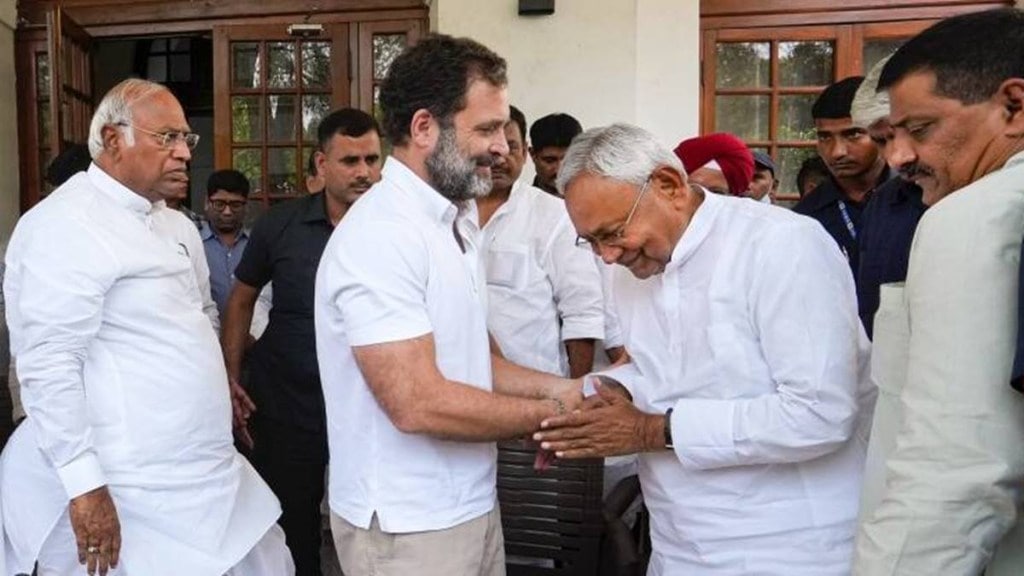As the Opposition parties join hands to demand a JPC in the Adani issue and against Rahul Gandhi’s disqualification from the Lok Sabha, top leaders of the Congress, Janata Dal (United) (JDU) and Rashtriya Janata Dal (RJD) met in Delhi on Wednesday.
The meeting, attended by Congress leader Rahul Gandhi, party president Mallikarjun Kharge, Bihar Chief Minister and JD(U) leader Nitish Kumar, and Bihar’s Deputy Chief Minister and RJD leader Tejashwi Yadav, explored the possibility of putting up a united fight against the ruling BJP. JD(U) president Rajiv Ranjan Singh, RJD’s Rajya Sabha MP Manoj Kumar Jha and Congress leader Salman Khursheed were present at the meeting too.
Addressing the media after the meeting, Kharge announced an alliance in the coming Lok Sabha election and the assembly elections. Gandhi said a “historic step” had been taken to unite Opposition parties. “It is a process, it will develop the Opposition’s vision for the country,” he said.
Talks have intensified in the recent past to create an alliance that can challenge Prime Minister Narendra Modi and his BJP in 2024 Lok Sabha elections.
We look back at the last United Front in power between 1996 and 1998.
United Front
After the 1996 elections, which returned a fractured verdict, Janata Dal, Samajwadi Party, Dravida Munnetra Kazhagam, Telugu Desam Party, Asom Gana Parishad, All India Indira Congress (Tiwari), Left Front (4 parties), Tamil Maanila Congress, National Conference, and Maharashtrawadi Gomantak Party formed a 13 party United Front (UF).
The alliance too was formed with the explicit objective of keeping the BJP out of power. The Congress supported the coalition from outside.
The leadership was first offered to former prime minister VP Singh and then to veteran West Bengal chief minister Jyoti Basu. Both declined it.
HD Gowda as PM
HD Deve Gowda was the first Janata Dal Prime Minister, and he was succeeded by IK Gujral.
Gowda’s term ran from June 1, 1996 to April 21, 1997. However, the Congress withdrew its support for Gowda due to disagreements between the alliance and the Congress.
IK Gujral as PM
Nonetheless, the party agreed to support a new government led by IK Gujral. He served as prime minister from April 21, 1997 to March 19, 1998.
But due to internal squabbling and differences with the Congress his government fell apart and the United Front lost power.
The Congress insisted on the DMK’s removal from the coalition as the Jain Commission Report on Rajiv Gandhi’s assassination suggested that the DMK, a UF component, had a role to play in it. But Gujral was adamant on having the party in the coalition.
BJP returns
India went to the polls once again in 1998, and the fragile nature of the Third Front became a powerful campaign tool for the BJP, and it won the elections.
But 13 months later in April 1999, Prime Minister Atal Bihari Vajpayee had to face no-trust motion, which he lost by a single vote after the BJP’s coalition partner – the AIADMK — withdrew support. While the BJP led National Democratic Alliance (NDA) coalition secured 269 votes, the opposition got 270.
As the opposition under the leadership of Congress’ Sonia Gandhi was unable to come up with the numbers to form government, the Lok Sabha was again dissolved and fresh elections were held. Vajpayee remained the “caretaker” Prime Minister until the polls were held.
In the 1999 Lok Sabha elections, the BJP-led NDA secured a comfortable and stable majority. After winning 303 seats out of the 543 seats, the first, stable NDA government was formed that ran for a full term.
Present Day Coalition Politics
This time around while some parties are clear about joining a front, others are sending out mixed signals.
For instance, the Trinamool Congress had announced that it would contest the Lok Sabha polls alone. However, the party seems to be changing its stand after Rahul Gandhi was disqualified as an MP following his conviction in a criminal defamation case over his “Modi surname” remark.
Soon after, TMC chief and West Bengal Chief Minister Mamata Banerjee called upon Opposition parties to unite and throw the BJP out of power.
Delhi Chief Minister Arvind Kejriwal and chief of the Aam Aadmi Party (AAP), which recently got national status and is in power in Delhi and Punjab, had earlier this month, said people’s unity, not Opposition unity, was important, adding that when parties say they have come together to defeat another party, people don’t appreciate that.
But Kejriwal soon changed tack after meeting Nitish Kumar and Tejashwi Yadav in Delhi on Wednesday as he lauded the Bihar CM for the initiative to unite the Opposition and also pressed for the need for it.
The Bharat Rashtra Samithi (earlier known as Telangana Rashtra Samithi), led by Telangana Chief Minister K Chandrashekar Rao, has made moves for an Opposition front but does not want Congress in it. KCR is not comfortable with the Congress party or Gandhi family as the Gandhis never forgave KCR for allegedly going back on his word to merge TRS with the Congress if it carves out Telangana State.

